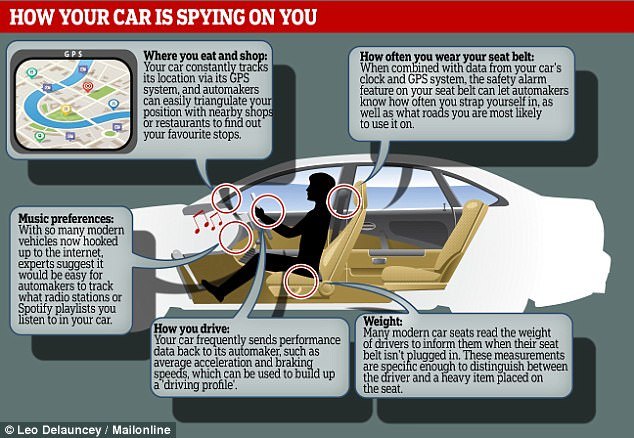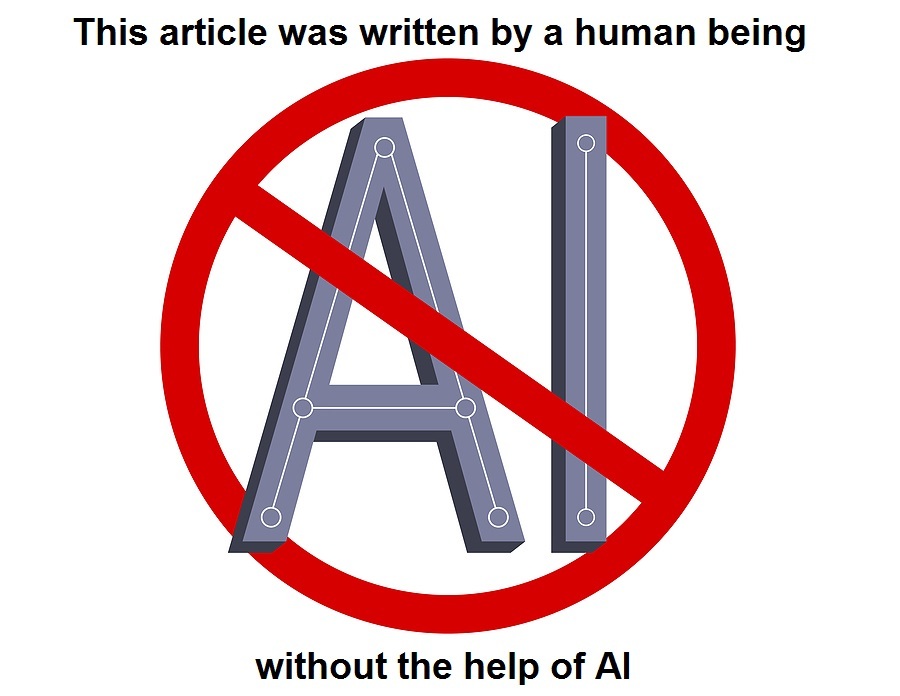
Comments by Brian Shilhavy
Editor, Health Impact News
Reviewers at the Mozilla Foundation published a Privacy Report yesterday (9/6/2023) on cars, and they concluded:
All 25 car brands we researched earned our *Privacy Not Included warning label — making cars the official worst category of products for privacy that we have ever reviewed.
They stated in their review that car companies have many more data-collecting opportunities than other products and apps people use, more than even smart devices in homes or the cell phones people take wherever they go.
The ways that car companies collect and share your data are so vast and complicated that we wrote an entire piece on how that works. The gist is: they can collect super intimate information about you — from your medical information, your genetic information, to your “sex life” (seriously), to how fast you drive, where you drive, and what songs you play in your car — in huge quantities. They then use it to invent more data about you through “inferences” about things like your intelligence, abilities, and interests.
It is getting more and more difficult to look up useful information on Internet searches about when older vehicles from these car companies began to be connected to the Internet and have GPS tracking capabilities.
I researched this about a year ago when I recommended to someone which year to purchase a certain model to avoid Internet connections and tracking, but that information today is much more difficult to find now.
Some of the older models started out by only connecting to the Internet through one’s cell phone, but today almost all vehicles connect to the Internet directly, and even if you choose to turn it “off”, it will still connect in certain situations, like updating new software, so the vehicles are ALWAYS connected.
If anyone has this kind of information collected about what year older models still were completely unconnected to the Internet and had no GPS , either contact me directly or share in the comments of this article.
Here is the review:
It’s Official: Cars Are the Worst Product Category We Have Ever Reviewed for Privacy
by Jen Caltrider, Misha Rykov and Zoë MacDonald
Foundation.mozilla.org
Ah, the wind in your hair, the open road ahead, and not a care in the world… except all the trackers, cameras, microphones, and sensors capturing your every move. Ugh. Modern cars are a privacy nightmare.
Car makers have been bragging about their cars being “computers on wheels” for years to promote their advanced features. However, the conversation about what driving a computer means for its occupants’ privacy hasn’t really caught up. While we worried that our doorbells and watches that connect to the internet might be spying on us, car brands quietly entered the data business by turning their vehicles into powerful data-gobbling machines. Machines that, because of their all those brag-worthy bells and whistles, have an unmatched power to watch, listen, and collect information about what you do and where you go in your car.
All 25 car brands we researched earned our *Privacy Not Included warning label — making cars the official worst category of products for privacy that we have ever reviewed.
The car brands we researched are terrible at privacy and security
Why are cars we researched so bad at privacy? And how did they fall so far below our standards? Let us count the ways!
1. They collect too much personal data (all of them)
We reviewed 25 car brands in our research and we handed out 25 “dings” for how those companies collect and use data and personal information. That’s right: every car brand we looked at collects more personal data than necessary and uses that information for a reason other than to operate your vehicle and manage their relationship with you. For context, 63% of the mental health apps (another product category that stinks at privacy) we reviewed this year received this “ding.”
And car companies have so many more data-collecting opportunities than other products and apps we use — more than even smart devices in our homes or the cell phones we take wherever we go.
They can collect personal information from how you interact with your car, the connected services you use in your car, the car’s app (which provides a gateway to information on your phone), and can gather even more information about you from third party sources like Sirius XM or Google Maps.
It’s a mess.
The ways that car companies collect and share your data are so vast and complicated that we wrote an entire piece on how that works. The gist is: they can collect super intimate information about you — from your medical information, your genetic information, to your “sex life” (seriously), to how fast you drive, where you drive, and what songs you play in your car — in huge quantities.
They then use it to invent more data about you through “inferences” about things like your intelligence, abilities, and interests.
2. Most (84%) share or sell your data
It’s bad enough for the behemoth corporations that own the car brands to have all that personal information in their possession, to use for their own research, marketing, or the ultra-vague “business purposes.” But then, most (84%) of the car brands we researched say they can share your personal data — with service providers, data brokers, and other businesses we know little or nothing about. Worse, nineteen (76%) say they can sell your personal data.
A surprising number (56%) also say they can share your information with the government or law enforcement in response to a “request.” Not a high bar court order, but something as easy as an “informal request.” Yikes — that’s a very low bar! A 2023 rewrite of Thelma & Louise would have the ladies in custody before you’ve had a chance to make a dent in your popcorn. But seriously, car companies’ willingness to share your data is beyond creepy. It has the potential to cause real harm and inspired our worst cars-and-privacy nightmares.
And keep in mind that we only know what companies do with personal data because of the privacy laws that make it illegal not to disclose that information (go California Consumer Privacy Act!).
So-called anonymized and aggregated data can (and probably is) shared too, with vehicle data hubs (the data brokers of the auto industry) and others. So while you are getting from A to B, you’re also funding your car’s thriving side-hustle in the data business in more ways than one.
3. Most (92%) give drivers little to no control over their personal data
All but two of the 25 car brands we reviewed earned our “ding” for data control, meaning only two car brands, Renault and Dacia (which are owned by the same parent company) say that all drivers have the right to have their personal data deleted.
We would like to think this deviation is one car company taking a stand for drivers’ privacy. It’s probably no coincidence though that these cars are only available in Europe — which is protected by the robust General Data Protection Regulation (GDPR) privacy law. In other words: car brands often do whatever they can legally get away with to your personal data.
4. We couldn’t confirm whether any of them meet our Minimum Security Standards
It’s so strange to us that dating apps and sex toys publish more detailed security information than cars. Even though the car brands we researched each had several long-winded privacy policies (Toyota wins with 12), we couldn’t find confirmation that any of the brands meet our Minimum Security Standards.
Our main concern is that we can’t tell whether any of the cars encrypt all of the personal information that sits on the car. And that’s the bare minimum! We don’t call them our state-of-the-art security standards, after all. We reached out (as we always do) by email to ask for clarity but most of the car companies completely ignored us. Those who at least responded (Mercedes-Benz, Honda, and technically Ford) still didn’t completely answer our basic security questions.
A failure to properly address cybersecurity might explain their frankly embarrassing security and privacy track records. We only looked at the last three years, but still found plenty to go on with 17 (68%) of the car brands earning the “bad track record” ding for leaks, hacks, and breaches that threatened their drivers’ privacy.
Some not-so-fun facts about these rankings:
- Tesla is only the second product we have ever reviewed to receive all of our privacy “dings.” (The first was an AI chatbot we reviewed earlier this year.) What set them apart was earning the “untrustworthy AI” ding. The brand’s AI-powered autopilot was reportedly involved in 17 deaths and 736 crashes and is currently the subject of multiple government investigations.
- Nissan earned its second-to-last spot for collecting some of the creepiest categories of data we have ever seen. It’s worth reading the review in full, but you should know it includes your “sexual activity.” Not to be out done, Kia also mentions they can collect information about your “sex life” in their privacy policy. Oh, and six car companies say they can collect your “genetic information” or “genetic characteristics.” Yes, reading car privacy policies is a scary endeavor.
- None of the car brands use language that meets Mozilla’s privacy standard about sharing information with the government or law enforcement, but Hyundai goes above and beyond. In their privacy policy, it says they will comply with “lawful requests, whether formal or informal.” That’s a serious red flag.
- All of the car brands on this list except for Tesla, Renault, and Dacia signed on to a list of Consumer Protection Principles from the US automotive industry group ALLIANCE FOR AUTOMOTIVE INNOVATION, INC. The list includes great privacy-preserving principles such as “data minimization,” “transparency,” and “choice.” But the number of car brands that follow these principles? Zero. It’s interesting if only because it means the car companies do clearly know what they should be doing to respect your privacy even though they absolutely don’t do it.
Read the full review at Foundation.mozilla.org
Related:
Is Your Car Recording You? Tesla Employees Admit to Sharing Photos and Videos of Owners Including “Intimacy”, Kids, and Location

See Also:
Understand the Times We are Currently Living Through
Exposing the Christian Zionism Cult
Jesus Would be Labeled as “Antisemitic” Today Because He Attacked the Jews and Warned His Followers About Their Evil Ways
Insider Exposes Freemasonry as the World’s Oldest Secret Religion and the Luciferian Plans for The New World Order

Identifying the Luciferian Globalists Implementing the New World Order – Who are the “Jews”?
Who are the Children of Abraham?
The Brain Myth: Your Intellect and Thoughts Originate in Your Heart, Not Your Brain
Fact Check: “Christianity” and the Christian Religion is NOT Found in the Bible – The Person Jesus Christ Is
Christian Myths: The Bible does NOT Teach that it is Required for Believers in Jesus to “Join a Church”
Exposing Christian Myths: The Bible does NOT Teach that Believers Should Always Obey the Government
Was the U.S. Constitution Written to Protect “We the People” or “We the Globalists”? Were the Founding Fathers Godly Men or Servants of Satan?
The Seal and Mark of God is Far More Important than the “Mark of the Beast” – Are You Prepared for What’s Coming?
The United States and The Beast: A look at Revelation in Light of Current Events Since 2020
The Satanic Roots to Modern Medicine – The Mark of the Beast?
Medicine: Idolatry in the Twenty First Century – 8-Year-Old Article More Relevant Today than the Day it was Written
Having problems receiving our emails? See:
How to Beat Internet Censorship and Create Your Own Newsfeed
We Are Now on Telegram. Video channels at Bitchute, and Odysee.
If our website is seized and shut down, find us on Telegram, as well as Bitchute and Odysee for further instructions about where to find us.
If you use the TOR Onion browser, here are the links and corresponding URLs to use in the TOR browser to find us on the Dark Web: Health Impact News, Vaccine Impact, Medical Kidnap, Created4Health, CoconutOil.com.





















3 Comments